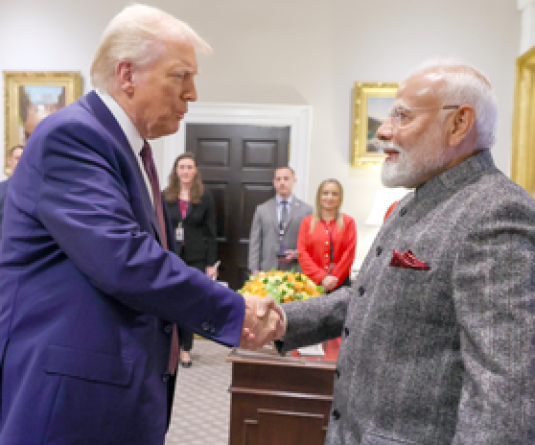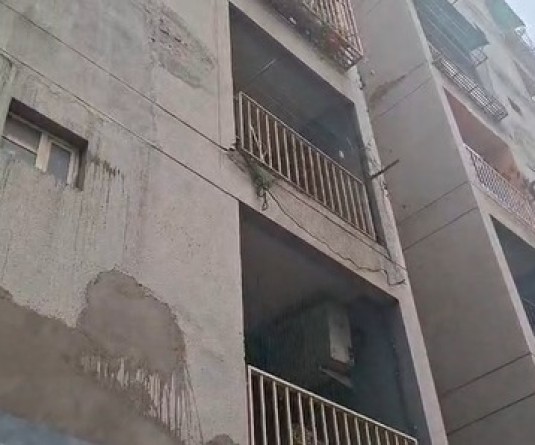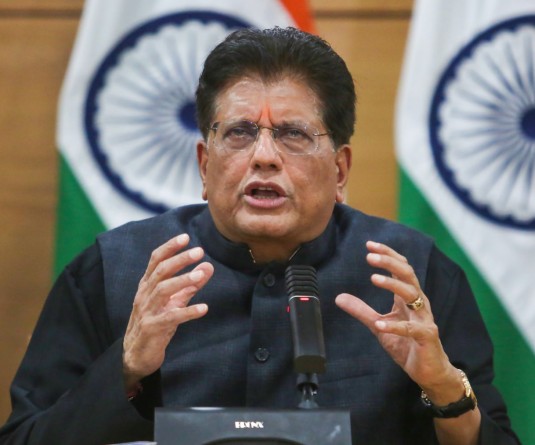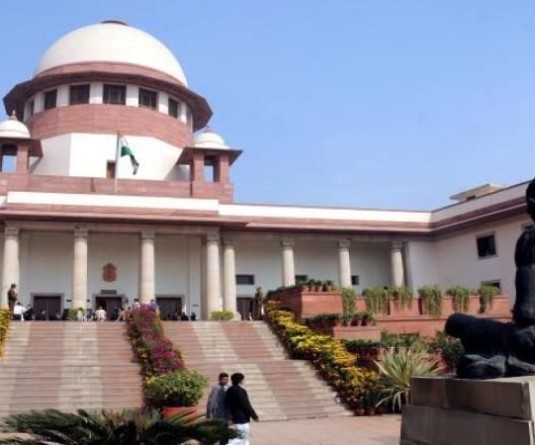
Indian Home Minister P. Chidambaram, left, speaks with Prime Minister Manmohan Singh during a conference of chief ministers of Indian states on internal security, in New Delhi, February 1. Singh said Tuesday that internal security situation was by and large stable but serious challenges and threats remain, according to local agencies. (AP Photo)
NEW Delhi, February 1 (Agencies): Naming left-wing extremism, cross-border terrorism and religious fundamentalism as serious challenges facing India, its Prime Minister Manmohan Singh Tuesday called for constant vigil and said the government was willing to consider the aspirations of any group if they genuinely desired peace. “Serious challenges and threats primarily from left-wing extremism, cross-border terrorism, religious fundamentalism and ethnic violence still persist...We have to maintain constant vigil and there should be no let up in our efforts in the fight against terrorism and communal violence,” Manmohan Singh said while inaugurating the fourth chief ministers’ conference on internal security here.
“Indian constitution is remarkably flexible and capable of accommodating a diverse range of aspirations. What is essential, however, is a genuine desire for peace and willingness to tread the path of oneness. “It is the commitment of our government, if these two conditions are met, we will respond in full measure in considering the legitimate demands of various groups,” he said. The prime minister said 2010 had witnessed a decrease in the number of violent incidents and casualties from left-wing extremists compared to previous years, but casualties among civilians due to Maoist violence had increased.
“Chhattisgarh, Bihar, West Bengal and Jharkhand continue to be a cause for concern in view of the number of violent incidents there. In Orissa and Maharashtra too, the situation is serious. We need to have a successful coordination of response and resources between the central and state security forces,” he said. The prime minister said the government had devised an integrated action plan with substantial funds for development of left-wing extremism-affected areas, under which 60-select tribal and backward districts of the country were chosen for implementation. He said there was every reason for the country to be satisfied with no incident of a flare-up being reported.
In particular, the “mature, respectful and dignified” response of the people to the court verdict in the Ram Janmabhoomi-Babri Masjid title suit in September last year provided reason to cheer, he said. “Tremendous restraint was shown by all sections of society after the court judgment in the Ram Janmabhoomi-Babri Masjid title suit. The response was by and large mature, respectful and dignified.” Manmohan Singh said there was no major flare-up on the communal front in 2010 and there was a steep fall in the number of terror attacks too, except for the two strikes in Pune and Varanasi. “While the intelligence agencies and security forces deserve full credit, it is important to emphasise that we must maintain constant vigil and there should be no let up in our efforts if we are to succeed in our fight against terrorism and communal violence,” he said.
According to him, the situation in Jammu and Kashmir, which witnessed violent protests last summer had improved vastly in the last four months due to several measures taken by both the state and the central governments. However, the prime minister said it was unfortunate that despite the restraint shown by the security forces during those protests, several young lives had been lost. “The summer of 2010 saw a troubled period in the state of Jammu and Kashmir in the form of protests, particularly by stone-pelters. This form of agitation generated a vicious cycle of violence. It is very unfortunate and sad that despite tremendous restraint shown by the security forces, many young people died and more than 1,500 security personnel were injured,” he said.
“As we meet today, the situation in the valley has improved following the visit of an all-party delegation to the state, the subsequent announcement of the eight-point programme and a number of positive measures jointly initiated by the central and state governments. The team of interlocutors are also trying to reach out to the various sections of people and holding a dialogue with them,” he added. In view of the stone-pelting, the home ministry had prepared a standard operating procedure to ensure non-lethal techniques are adopted by the state and central security forces, which would be shared with the chief ministers, Manmohan Singh said. On the situation in the northeast, the prime minister said there was visible change in the states, with violence at its lowest levels in many years.
“Indian constitution is remarkably flexible and capable of accommodating a diverse range of aspirations. What is essential, however, is a genuine desire for peace and willingness to tread the path of oneness. “It is the commitment of our government, if these two conditions are met, we will respond in full measure in considering the legitimate demands of various groups,” he said. The prime minister said 2010 had witnessed a decrease in the number of violent incidents and casualties from left-wing extremists compared to previous years, but casualties among civilians due to Maoist violence had increased.
“Chhattisgarh, Bihar, West Bengal and Jharkhand continue to be a cause for concern in view of the number of violent incidents there. In Orissa and Maharashtra too, the situation is serious. We need to have a successful coordination of response and resources between the central and state security forces,” he said. The prime minister said the government had devised an integrated action plan with substantial funds for development of left-wing extremism-affected areas, under which 60-select tribal and backward districts of the country were chosen for implementation. He said there was every reason for the country to be satisfied with no incident of a flare-up being reported.
In particular, the “mature, respectful and dignified” response of the people to the court verdict in the Ram Janmabhoomi-Babri Masjid title suit in September last year provided reason to cheer, he said. “Tremendous restraint was shown by all sections of society after the court judgment in the Ram Janmabhoomi-Babri Masjid title suit. The response was by and large mature, respectful and dignified.” Manmohan Singh said there was no major flare-up on the communal front in 2010 and there was a steep fall in the number of terror attacks too, except for the two strikes in Pune and Varanasi. “While the intelligence agencies and security forces deserve full credit, it is important to emphasise that we must maintain constant vigil and there should be no let up in our efforts if we are to succeed in our fight against terrorism and communal violence,” he said.
According to him, the situation in Jammu and Kashmir, which witnessed violent protests last summer had improved vastly in the last four months due to several measures taken by both the state and the central governments. However, the prime minister said it was unfortunate that despite the restraint shown by the security forces during those protests, several young lives had been lost. “The summer of 2010 saw a troubled period in the state of Jammu and Kashmir in the form of protests, particularly by stone-pelters. This form of agitation generated a vicious cycle of violence. It is very unfortunate and sad that despite tremendous restraint shown by the security forces, many young people died and more than 1,500 security personnel were injured,” he said.
“As we meet today, the situation in the valley has improved following the visit of an all-party delegation to the state, the subsequent announcement of the eight-point programme and a number of positive measures jointly initiated by the central and state governments. The team of interlocutors are also trying to reach out to the various sections of people and holding a dialogue with them,” he added. In view of the stone-pelting, the home ministry had prepared a standard operating procedure to ensure non-lethal techniques are adopted by the state and central security forces, which would be shared with the chief ministers, Manmohan Singh said. On the situation in the northeast, the prime minister said there was visible change in the states, with violence at its lowest levels in many years.
PC talks tough on internal security
New Delhi, February 1 (Agencies): Home Minister P Chidambaram at the internal security meet on Tuesday expressed his concern over security situation in the country but called for strong measures to counter the challenge. “We live in troubled neighborhood, as a result we are facing terror, inflow of refugees. We have to face everything within given resources,” said the Home Minister. But he pointed out that India is not an isolated case and said that terror incidents were taking place in Iran, Iraq, Nigeria, Pakistan and Afghanistan.
Chidambaram contradicted UP Chief Minister Mayawati regarding terror attacks in the state and insisted that the IB had shared intelligence with the state government before Varanasi blast. “We have shared intelligence input on recent terror attack including Pune and Varanasi,” said Chidambaram. Talking on the Naxal issue, the Home Minister informed that neither the effected states have made significant inroads, nor have CPI Maoists gained upper hand and there were casualties on both sides in 2010. “We have provided extra power to state to fight Naxals,” assures the Home Minister after informing that the CPI Maoists have added four companies to people liberation gurreila army.
Talking on another internal security challenge by insurgence groups in North East, Chidambaram said, “There was very less violence in 2010.” The Home Minister also informed that nine NE insurgent groups are ready for talks with the Government and said, “We are ready to give them mainstream life.” Chidambaram described the internal security situation in Jammu and Kashmir is unique and the situation is changing. Talking over the challenges faced from various agitating groups and blockeds created by them, Chidambaram informed that there was Rs 10,500 crore loss in 2010 due to rasta roko alone. “I request State governments to provide maximum security to Highways and Railways,” he said.
To counter the internal security challenges, there will be massive recruitments in security forces informed the Home Minister. He insisted on the need of taking bold and harsh decision to counter the internal security challenges and assures the states that the Central Government is ready to give full support. “We are very clear. Every terror group will be produced before law for trial,” said Chidambarm.
Chidambaram contradicted UP Chief Minister Mayawati regarding terror attacks in the state and insisted that the IB had shared intelligence with the state government before Varanasi blast. “We have shared intelligence input on recent terror attack including Pune and Varanasi,” said Chidambaram. Talking on the Naxal issue, the Home Minister informed that neither the effected states have made significant inroads, nor have CPI Maoists gained upper hand and there were casualties on both sides in 2010. “We have provided extra power to state to fight Naxals,” assures the Home Minister after informing that the CPI Maoists have added four companies to people liberation gurreila army.
Talking on another internal security challenge by insurgence groups in North East, Chidambaram said, “There was very less violence in 2010.” The Home Minister also informed that nine NE insurgent groups are ready for talks with the Government and said, “We are ready to give them mainstream life.” Chidambaram described the internal security situation in Jammu and Kashmir is unique and the situation is changing. Talking over the challenges faced from various agitating groups and blockeds created by them, Chidambaram informed that there was Rs 10,500 crore loss in 2010 due to rasta roko alone. “I request State governments to provide maximum security to Highways and Railways,” he said.
To counter the internal security challenges, there will be massive recruitments in security forces informed the Home Minister. He insisted on the need of taking bold and harsh decision to counter the internal security challenges and assures the states that the Central Government is ready to give full support. “We are very clear. Every terror group will be produced before law for trial,” said Chidambarm.






